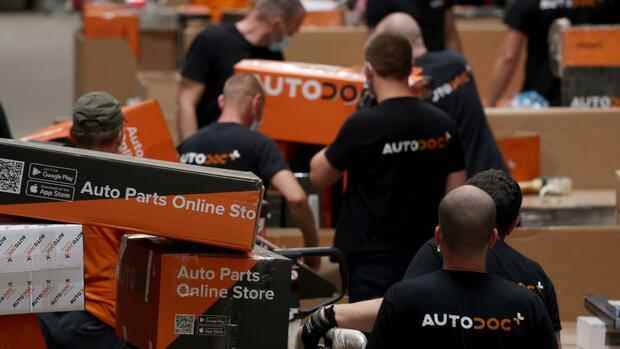Autodoc is Europe’s largest online spare parts dealer.
(Photo: © 2021 Bloomberg Finance LP)
Frankfurt According to financial circles, the online spare parts dealer Autodoc has initially postponed the planned IPO and is now looking for an investor. The founder-held company is now on the lookout for a financier who would take a minority stake in the company amid declining valuations at tech companies, but remains eyeing the long-term goal of going public, several people familiar with the transaction said. The valuation of the possible entry of an investor is still unclear, but will probably be below the five billion euros that were discussed in the summer.
“For a company that is one of the leaders in its sector in Europe, there are numerous options that we are constantly looking at and evaluating,” said an Autodoc spokesman.
In 2020, the company posted an operating result (Ebitda) of EUR 93.5 million and a surplus of EUR 55 million on sales of EUR 842 million. In 2021, the company, which has been operating as a stock corporation since September, broke the one-billion mark in sales and announced double-digit growth rates for 2022. According to financial circles, the company expects revenues of a good 1.2 billion euros and an operating result (Ebitda) of over 150 million euros in 2022.
When making their own assessment of the rating of Autodoc, investors will probably orientate themselves on other online car companies on the one hand and e-commerce dealers on the other. Since Autodoc – unlike many other start-ups – is already profitable, you look at both expected sales and profits.
Top jobs of the day
Find the best jobs now and
be notified by email.
Auto1, Vroom and Carvana trade at 0.2 to 1.8 times sales on the exchange, Auto1 at 13 times Ebitda, the other two have no significant profits. E-commerce firms like Zalando, Allegro and THG are trading at 1.4x to 7.4x revenue and 9x to 23x EBITDA.
Founders own 100 percent of the company
According to capital market bankers, a valuation of around three billion euros for Autodoc is currently realistic. Although valuations for technology companies have softened recently, they are still considered high. There are increasingly critical voices and even warnings of a unicorn bubble.
According to financial circles, Autodoc had planned an IPO for autumn 2021, but then put the project on hold in view of volatile stock markets – like online car dealer MeinAuto a few months earlier. Autodoc had previously hired two men with stock market experience, Christian Gisy as the new co-boss and Bert Althaus as the new chief financial officer.
The online spare parts dealer was founded in 2008 by Alexej Erdle, Max Wegner and Vitalij Kungel. Unlike many other successful German e-commerce companies, the three Aussiedler have no connection to the start-up factory Rocket Internet, they have not attended a private business school and have never taken on venture capital. From the very beginning, the company financed its growth from cash flow – the company is 100 percent owned by the three founders.
The business idea was based on a simple observation: spare parts were significantly more expensive in specialist shops than on the Internet – but in German-speaking countries there were hardly any dealers who supplied technically savvy private users.
So in 2008 the founders set up a portal themselves. Kungel took over the commercial area, Wegner the IT, Erdle, as a trained car mechanic, brought the industry knowledge with him.
The market is lucrative, BCG estimates the turnover of workshops with spare parts and labor costs in Europe at 225 billion euros, with a constant increase of one to two percent per year. Large online retailers benefit from two trends:
- Firstly, as in so many other areas of life, digital sales are increasing significantly: in Europe, only five to ten percent of spare parts are currently sold online, depending on the market. BCG estimates that the share will grow to 20 percent.
- Secondly, experts expect a consolidation of the fragmented industry, from which the large providers are likely to benefit.
More: Delivery apps Flink and Gorillas find prominent investors
